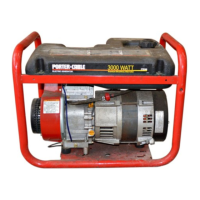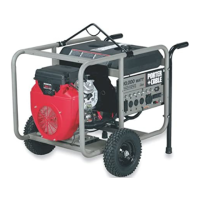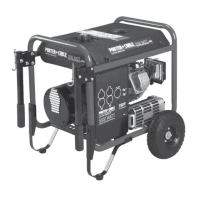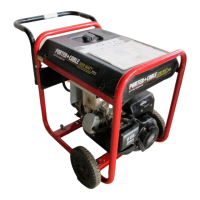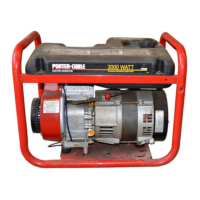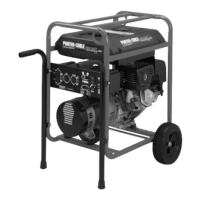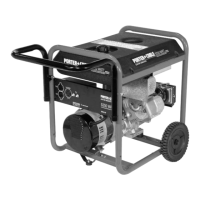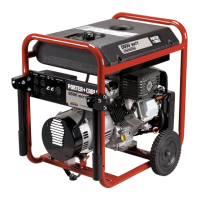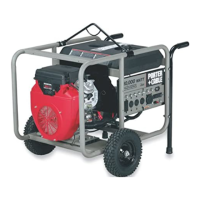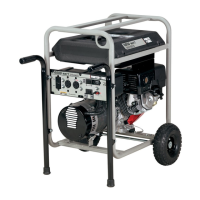Do you have a question about the Porter-Cable PCI2200 and is the answer not in the manual?
Defines "DANGER" symbol for imminent hazards resulting in death or serious injury.
Defines "WARNING" symbol for hazardous situations resulting in death or serious injury.
Defines "CAUTION" symbol for hazardous situations resulting in minor or moderate injury.
Defines "CAUTION" without a symbol for hazardous situations resulting in property damage.
Warns about Carbon Monoxide danger from engine exhaust and proper ventilation.
Warns to read the manual for safety, operation, and maintenance instructions before use.
Describes potential hazards like electrocution and fire from improper electrical connections.
Provides methods to prevent electrocution and fire, including using transfer switches.
Details how gasoline vapors can ignite, causing explosion or fire.
Outlines preventive measures for fuel handling and storage to avoid fire/explosion.
Explains the danger of carbon monoxide from exhaust fumes leading to injury or death.
Provides instructions on operating the engine outdoors and away from enclosed areas.
Highlights risks of fuel/oil leaks during transport or storage, leading to fire or injury.
Gives guidance on safe transporting and storing practices for the generator.
Warns about severe burns from touching hot engine parts after operation.
Advises to avoid touching hot surfaces and allow the generator to cool down.
Details risks of injury from accidental starting or contact with moving parts.
Provides safety measures like disconnecting the spark plug and keeping clear of moving parts.
Warns that unsafe operation can lead to serious injury or death.
Lists essential practices for safe generator operation and awareness.
Explains that noise from the product can contribute to hearing loss.
Recommends wearing certified hearing protection for noise safety.
Warns that lifting too heavy an object can cause serious injury.
Advises to get assistance when lifting the generator due to its weight.
Identifies component A as the Engine.
Identifies component B as the Alternator.
Identifies component C as the Control Panel.
Identifies component D as the Fuel Cap.
Identifies component E as the Fuel Tank.
Identifies component F as the Fuel Gauge.
Identifies component G as the Fuel Shut Off Valve.
Identifies engine component H as the Crank Shaft PTO.
Identifies engine component I as the Air Filter.
Identifies engine component J as the Recoil Pull Start.
Identifies engine component K as the Oil Drain.
Identifies hot surface R as the Valve Cover.
Identifies hot surface S as the Exhaust.
Identifies hot surface T as the Spark Plug.
Identifies hot surface U as the Muffler.
Identifies hot surface V as the Cylinder Head.
Identifies panel control W as the Twistlock Receptacle.
Identifies panel control X as the Ground Nut.
Identifies panel control Y as the Voltage Selector Switch.
Identifies panel control Z as the Engine On/Off Switch.
Identifies panel control AA as the Main Breaker.
Identifies panel control BB as the Duplex Receptacle.
Identifies panel control CC as the 220V Receptacle.
Details specifications related to the generator's alternator.
Provides engine specifications like horsepower and displacement.
Specifies fuel type and octane requirements.
Details the type of air cleaner used.
Lists recommended spark plug types and specifies the correct gap.
Indicates the status of the fuel shut off solenoid.
Indicates the status of the idle control.
Indicates the presence of an electric starter.
Specifies the maximum recommended tilt angle.
Lists the types and quantities of receptacles available.
Provides general specifications like dimensions and weight.
Details specifications related to the generator's alternator.
Provides engine specifications like horsepower and displacement.
Specifies fuel type and octane requirements.
Details the type of air cleaner used.
Lists recommended spark plug types and specifies the correct gap.
Indicates the status of the fuel shut off solenoid.
Indicates the status of the idle control.
Indicates the presence of an electric starter.
Specifies the maximum recommended tilt angle.
Lists the types and quantities of receptacles available.
Provides general specifications like dimensions and weight.
Details specifications related to the generator's alternator.
Provides engine specifications like horsepower and displacement.
Specifies fuel type and octane requirements.
Details the type of air cleaner used.
Lists recommended spark plug types and specifies the correct gap.
Indicates the status of the fuel shut off solenoid.
Indicates the status of the idle control.
Indicates the presence of an electric starter.
Specifies the maximum recommended tilt angle.
Lists the types and quantities of receptacles available.
Provides general specifications like dimensions and weight.
Details specifications related to the generator's alternator.
Provides engine specifications like horsepower and displacement.
Specifies fuel type and octane requirements.
Details the type of air cleaner used.
Lists recommended spark plug types and specifies the correct gap.
Indicates the status of the idle control.
Indicates the presence of an electric starter.
Specifies the maximum recommended tilt angle.
Lists the types and quantities of receptacles available.
Provides general specifications like dimensions and weight.
Details specifications related to the generator's alternator.
Provides engine specifications like horsepower and displacement.
Specifies fuel type and octane requirements.
Details the type of air cleaner used.
Lists recommended spark plug types and specifies the correct gap.
Indicates the status of the fuel shut off solenoid.
Indicates the status of the idle control.
Indicates the presence of an electric starter.
Specifies the maximum recommended tilt angle.
Lists the types and quantities of receptacles available.
Provides general specifications like dimensions and weight.
Details specifications related to the generator's alternator.
Provides engine specifications like horsepower and displacement.
Specifies fuel type and octane requirements.
Details the type of air cleaner used.
Details the low oil shut down feature.
Lists recommended spark plug types and specifies the correct gap.
Indicates the status of the fuel shut off solenoid.
Indicates the status of the idle control.
Indicates the presence of an electric starter.
Specifies the maximum recommended tilt angle.
Lists the types and quantities of receptacles available.
Provides general specifications like dimensions and weight.
Details specifications related to the generator's alternator.
Provides engine specifications like horsepower and displacement.
Specifies fuel type and octane requirements.
Details the type of air cleaner used.
Details the low oil shut down feature.
Lists recommended spark plug types and specifies the correct gap.
Indicates the status of the idle control.
Indicates the presence of an electric starter.
Specifies the maximum recommended tilt angle.
Lists the types and quantities of receptacles available.
Provides general specifications like dimensions and weight.
Explains the process and importance of grounding the generator.
Provides warnings and guidelines for using appropriate extension cords.
Details voltage requirements for extension cords.
Specifies AWG ratings based on amperage.
Lists extension cord lengths for reference.
Shows voltage drop based on load and wire gauge.
Instructions for assembling the wheel kit for specific models.
Steps for installing the generator handles and attaching the assembly.
Warns that the engine is shipped without oil and must be filled.
Provides SAE 10W-30 oil recommendation and a viscosity chart.
Steps on how to add engine oil, including dipstick use.
Instructions and warnings for adding gasoline to the fuel tank.
Explains the use and requirements for oxygenated fuels.
Reiterates the danger of carbon monoxide and need for outdoor ventilation.
Advises checking local regulations for acceptable noise levels.
Explains the function of the engine On/Off switch for starting and stopping.
Describes the main breaker's function and reset procedure.
Explains how the voltage selector switch operates for different voltage modes.
Notes that receptacles are protected by the main breaker and need GFCI.
Details the low oil shutdown feature and its sensitivity.
Lists essential pre-start checks for safe generator operation.
Provides step-by-step instructions for starting the generator.
Warns against tampering with engine speed settings due to potential damage.
Advises unplugging loads before starting to prevent appliance damage.
Outlines the procedure for stopping the generator normally and in emergencies.
Guides on connecting electrical loads in the correct order to prevent damage.
Warns against exceeding the current limit for receptacles.
Explains performance changes and carburetor modifications for high altitudes.
Describes how temperature affects generator output and starting.
Explains why regular maintenance is essential for safety and operation.
Lists critical safety precautions to follow during maintenance.
General warnings and notes about maintenance procedures.
Procedure for cleaning the generator's exterior.
Routine check of the engine oil level.
Procedure for changing the engine oil.
Instructions for cleaning the air filter element.
Procedure for cleaning the spark plugs.
Inspection of fuel system components.
Checking for any oil leaks.
Information about the sediment cup.
Procedure for cleaning the fuel tank and filter.
Monitoring for abnormal operational sounds.
Procedure for checking and adjusting valve clearance.
Steps for preparing the generator for long-term storage.
Guidelines and warnings for cleaning the generator.
Step-by-step instructions for cleaning the fuel sediment cup.
Warns about hot parts during air filter servicing.
Detailed steps for cleaning the air filter elements.
Warns about hot engine parts when servicing oil.
Step-by-step instructions for checking the engine oil level.
Note on proper disposal of used engine oil.
Advises using correct spark plugs and ensuring proper gap.
Warns about hot muffler when working on spark plug.
Importance of spark plug gap and condition for engine operation.
Safety requirement to wear eye protection when working with spark plugs.
Steps for draining the carburetor bowl.
Warns about fire risk when cleaning the debris screen.
Safety warning for using compressed air on the debris screen.
Advises observing safe lifting procedures due to unit weight.
Lists essential checks before transporting the generator.
Warns about hot parts before transporting.
Warnings about storing the generator indoors or in enclosed areas.
Instructions for draining fuel and oil before storage.
Information on obtaining replacement parts.
Details about service quality and guarantees.
Lists common problems encountered with the generator.
Codes associated with specific problems.
Lists potential causes for generator malfunctions.
Provides solutions for identified generator problems.
Lists problem codes and their possible causes.
Provides solutions for identified generator problems.
| Brand | Porter-Cable |
|---|---|
| Model | PCI2200 |
| Category | Portable Generator |
| Language | English |
